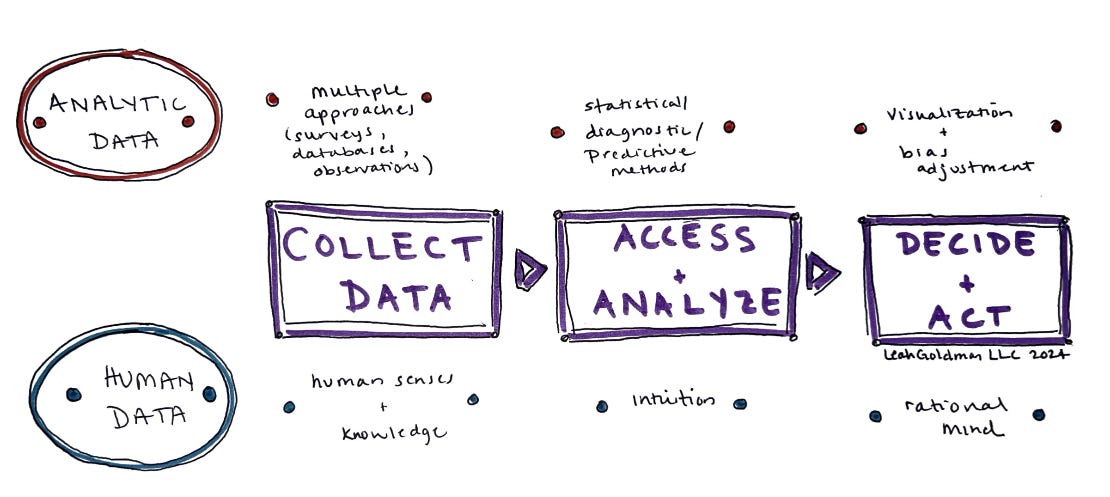What Do I Do Now?: Intuition and Decisions
When the world shifts or technology makes a step-change, data and analytics may no longer be relevant. Can we trust data-driven decisions?
It’s been a few weeks since my last post. March was a blur. It’s been winter and spring break. Here in Boston, flower buds are peeking and nor’easters are howling. Q1 has wrapped and somehow it is April.
I can now mark time with newsletters. I’ve been reflecting on some recent themes: I’m definitely in my spring resolution season. I’ve enjoyed impassioned discussions with friends about influence; how we can grow it through our leadership and where the perimeter and bounds exist. My post about choice and decisions resulted in some wonderful and thoughtful reconnections with family and friends.
I continue to be interested in how we make decisions. Specifically the power of the invisible, innate, and instinctual aspect of intuition. I wrote about intuition in the VIEW framework. It is a key element of Empowerment and in that post I described intuition as:
Knowing when something feels wrong - or right. Trusting your gut to make decisions. Listening to the inner voice whispering the true to you answer. Honoring that inner wisdom that leads us down the right for me path - not the right for them way. - From Intuition | Know, and trust, thyself
Let’s consider Intuition and what it has to do with making decisions.
Uncertainty, Risk and the Limits of Data
Generally, and especially in our work experience, we believe that data-driven, or at least data-informed decisions are the gold standard. We use data from the past to inform our decisions about the future. Lately, I’ve been thinking about situations where data from the past are either non-existent or (more likely) irrelevant and outdated.
I’m currently reading the book ‘Fluke’ by Brian Klaas (thanks for the rec, Dad!). In it, Klaas distinguishes between "risk" and "uncertainty". Risk refers to situations where the possible outcomes are known, like tossing a die. Uncertainty, on the other hand, refers to situations where the future outcome is unknown and the underlying mechanism producing that outcome is also unknown.
Klaas suggests that we often try to apply probability and data analysis to situations that involve fundamental uncertainty, rather than just risk. He argues that we need to be more humble about our ability to make decisions based on data, especially in the face of uncertainty.
"We too often pretend that we can answer questions that we cannot. That overconfidence has meant that we write out chance, chaos, and contingent flukes because they don't fit into the neater world we like to imagine exists." - Brian Klaas, Fluke
I agree with Klaas and I also believe that in the absence of data and analysis, we must use other means to help us navigate the uncertainty. There’s only so much that we know about certain topics, especially topics that we thought we understood until everything changed. See: work pre- and post- 2020.
How can we use data to make decisions about the future of work when most data that we have about how people work was collected before the pandemic?
How can we make decisions about the future of industries most impacted by AI when all the industry data was collected before the invention of and broad access to these tools and technologies?
How do we decide what is the next right thing to do when uncertainty (in forms such as acquisitions, layoffs, downturns, bubbles) exists all around and ahead of us?
When the world shifts and technology makes a step-change, the data and analytics we thought we had - indicating trends, correlations, and conclusions - may no longer be relevant as the entire system changes. Can we trust these data-driven decisions?
Intuition Serves when Data Cannot
If we trust only the decisions we make with data and analytics, then we are at a disadvantage. Humans have the benefit of not just logical and analytical reasoning, but also abstract and creative thinking. It is what separates us from both animals and machines. Animals have highly-tuned associative, instinctual intuition, which they need to survive. AI and robots can understand numbers and commands to perform analysis. We humans are not left-brained or right-brained. Our differentiator and competitive edge is our whole brain. If we’re not using our entire brain, we’re at a disadvantage.
The intuitive mind is a sacred gift and the rational mind is a faithful servant. We have created a society that honors the servant and has forgotten the gift.
- Albert Einstein
When we don’t have models and structurable data but must make a decision, what can we rely on? Past experience, response from actions taken, advice, perspectives from others, our own wisdom, the wisdom of those before us. We use our senses to collect this human data, our intuition to access and analyze the data, and our rational mind to decide and act.

IA: Intuition Algorithm
An algorithm is a set of precise, step-by-step instructions or rules for solving a specific problem or performing a specific task. All of these popular AI models are just algorithms for data that can be collected and structured. OpenAI spent over $500 million to train GPT-4. What if we had an algorithm for all the data we cannot see? What if that IS our intuition? How can we better train that model? How much is that worth to us?
If we had a set of instructions for how to tap into our intuition and access to tools and models that bring our intuition to bear, we could use the unstructured data of our experience to confidently make decisions. We could look at a problem and isolate variables that we know in our gut may impact the decision. We could have a clearer perspective of the choices available. We could access our abstract and creative thinking to find innovative solutions and make decisions.
We are drowning in information, while starving for wisdom. The world henceforth will be run by synthesizers, people able to put together the right information at the right time, think critically about it, and make important choices wisely.
- E. O. Wilson
People who can access all of the information available and make decisions with confidence will be positioned as thought leaders, influencers and linchpins of the future. These are the humans in the loop, the individuals with a tool that gives them an edge amidst artificial intelligence, AI. These people leverage the power of IA, the Intuition Algorithm. When we use our whole sphere of experience and all the data available to us, we might just make our best decisions yet.







Hilarious.